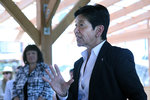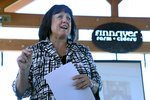Two state Supreme Court justices running for re-election defended the court’s two controversial school rulings against “vicious” opposition from an “orchestrated” group of challengers Aug. …
This item is available in full to subscribers.
We have recently launched a new and improved website. To continue reading, you will need to either log into your subscriber account, or purchase a new subscription.
If you had an active account on our previous website, then you have an account here. Simply reset your password to regain access to your account.
If you did not have an account on our previous website, but are a current print subscriber, click here to set up your website account.
Otherwise, click here to view your options for subscribing.
* Having trouble? Call our circulation department at 360-385-2900, or email our support.
Please log in to continue |
|



Two state Supreme Court justices running for re-election defended the court’s two controversial school rulings against “vicious” opposition from an “orchestrated” group of challengers Aug. 12 in Chimacum.
Chief Justice Barbara Madsen and Justice Mary Yu visited Finnriver Farm & Cidery to present a continuing legal education session for members of the Jefferson County Bar Association. About 60 people attended.
In the lead up to the Nov. 8 general election, Madsen, Yu and Justice Charlie Wiggins are defending their seats against Kittitas County Prosecutor Greg Zempel, Gonzaga University law professor David DeWolf and Federal Way municipal court judge Dave Larson, respectively.
“I think they were recruited to run,” Yu said. “I think it’s an attack on the court.”
While Zempel has criticized the court for being unpredictable and too political, DeWolf and Larson have specifically denounced its 2012 McCleary and 2015 charter schools decisions.
Yu, who was appointed to the court in May 2014 and elected that November, said those two decisions represent the primary critique in their bids for re-election. Madsen, a member of the court since 1992 and chief since 2010, said the decisions weren’t political.
“We are not taking political positions,” said Madsen, who wrote the court’s September 2015 opinion ruling that charter schools cannot be funded with the same money as traditional public schools.
“We are not proponents or opponents of charter schools. That’s not our job. What we do is interpret the constitution. We never discuss our personal views of these cases; we only discuss our professional views of these cases. I don’t even know in that room of nine who supports charter schools and who doesn’t.”
In January 2012, the court ruled that the state Legislature was not meeting its constitutional obligation to amply fund a uniform system of basic education. It also retained jurisdiction, ordering the Legislature to file progress reports after each session to show that it had a plan to meet its obligation by 2018.
Seeing no plan or progress, the court found the Legislature in contempt in August 2015, imposing a $100,000-per-day fine. That fine is now more than $36 million.
“We’re simply asking, ‘Just tell us how you’re going to actually fund it. Just give us a plan,’” Yu said. “We’re not writing the budget. They came up with the number. They defined education. People should read the decisions. We are so aware that we are reaching our constitutional limitations. We are aware of that, which is why we’ve been so patient.”
Jill Landes, Jefferson County District Court judge, asked how the court expects to get compliance when its monetary fine seems like an “empty threat.”
“Courts don’t have armies,” Madsen said, suggesting the court could potentially call on the executive branch of state government, such as governor or superintendent of public instruction to enforce its ruling.
“We’re not at that point and that’s because we are extremely sensitive to the separation of powers between the branches. That does not mean that this will not be abided by. It will not end that this court will not have its order carried out.”
Madsen pointed to a similar case in Kansas in which that state’s high court found its Legislature was failing to fully fund public education per its obligation under the state constitution.
“They said they were going to close the schools if the Legislature did not fully fund basic education,” Madsen said. “Those justices were attacked by their Legislature and their governor. It’s just appalling to see what’s gone on in Kansas.”
Yu said it’s unfair that a few wealthy donors are bankrolling the justices’ three challengers, especially as most of it targets Madsen.
“A judicial race can be run statewide for like $100,000,” said Madsen, who has $41,000 to Zempel’s $52,000, not counting independent expenditures by political action committees (PAC). “That’s the usual amount for a judge running statewide because there just shouldn’t be big money in judicial races. It’s unseemly.”
The Judicial Integrity WA PAC has contributed $100,000 to Zempel’s campaign, while the Stand For Children PAC has contributed $130,000, according to the state Public Disclosure Commission.
“It puts all of the courts at risk when suddenly anybody who's got money can somehow determine who’s going to be on your Supreme Court,” Yu said. “We’re popularly elected, which means the people in the state of Washington should decide that.”